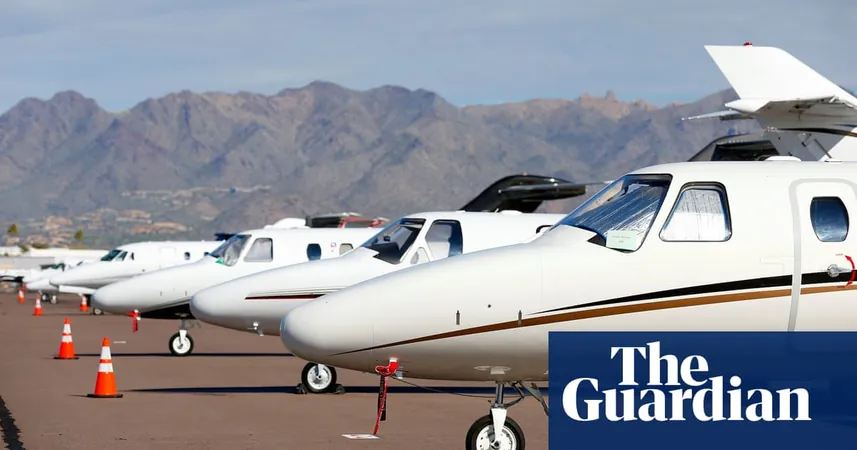
Shocking Surge in Private Jet Flights Raises Alarms Over Climate Crisis
2024-11-07
Author: Jia
Private jet travel is skyrocketing, leading to an alarming increase in climate-warming emissions, which have surged by 50% in just a few short years. According to a groundbreaking global analysis that examined over 25,000 private jets and close to 19 million flights from 2019 to 2023, the environmental impact of these luxury flights is becoming increasingly unsustainable.
The startling findings reveal that nearly half of all private jets traveled less than 500 kilometers, with approximately 900,000 flights being utilized 'like taxis' for journeys shorter than 50 kilometers. Many of these flights cater to vacationers seeking sunny summer destinations, as evidenced by the 1,800 private flights during the 2022 FIFA World Cup in Qatar.
Despite being used by a mere 0.003% of the global population, private flights are deemed the most polluting mode of transport. For context, passengers aboard larger private jets generate more carbon emissions in a single hour than the average person does in an entire year. In 2023 alone, total emissions from private jets surpassed 15 million tonnes—more than the annual emissions produced by the 60 million residents of Tanzania.
The United States is at the forefront of this phenomenon, accounting for a staggering 69% of all private jet flights, with Canada, the UK, and Australia also ranking among the top ten countries for private aviation. In the UK, a private jet takes to the skies every six minutes. If current trends continue, the number of business jets is expected to rise by an additional 8,500 by 2033, outpacing any efficiency improvements and propelling private flight emissions even higher.
Research led by Prof. Stefan Gössling from Linnaeus University in Sweden highlights the stark disparity in emissions between the affluent minority and the broader population, stressing that addressing the emissions of the wealthy is crucial for combating global warming. "The wealthy are a very small share of the population but are increasing their emissions very quickly and by very large magnitudes," Gössling noted.
The study, published in the journal Communications Earth & Environment, utilized data from the ADS-B Exchange platform, which tracks signals from aircraft transponders to monitor position and altitude. The extensive dataset—amounting to 1.8 terabytes—focused on 72 aircraft models marketed as business jets. It's important to acknowledge that the reported emissions figures are likely conservative, omitting data from smaller planes and ground taxiing.
Between 2019 and 2023, the number of private jets jumped by 28%, while the total distance flown soared by 53%. Strikingly, fewer than one-third of all flights exceeded 1,000 kilometers, with a significant portion—about 900,000 flight segments—covering distances of less than 50 kilometers.
The analysis also revealed that private jet use is heavily concentrated during peak leisure periods, such as summer weekends in hotspots like Ibiza and Nice, where usage peaks during vacation seasons. In the US, high-profile celebrities including Taylor Swift, Drake, and Oprah Winfrey have come under fire for their extravagant private jet travel.
Significant events also contribute to the uptick in private aviation. The World Economic Forum in Davos in 2023 saw approximately 660 private jet flights, while the COP28 climate summit in Dubai attracted 291 flights.
While the reasons behind the recent surge in private jet usage remain underexplored, some speculate it is linked to a growing aversion to shared cabins on commercial flights, a tendency that gained traction during the COVID pandemic. Industry insiders characterize private jet users as "ultra-high net worth" individuals, about 250,000 strong, boasting an average wealth of $123 million each.
Going forward, Gössling advocates for a policy shift that would require passengers to account for the climate damage linked to their carbon emissions—estimated at €200 per tonne of CO2. He suggests that increasing landing fees for private jets—currently quite low—could serve as a deterrent, proposing a fee of approximately €5,000 that could effectively double the cost of typical private flights.
Alethea Warrington, who leads aviation initiatives at the climate charity Possible, decried the skyrocketing emissions from private jets. "They represent an utterly unjustifiable and extravagant use of our limited emissions budget, especially as the climate crisis worsens," she stated emphatically. "It’s time for governments to take serious action—it's time for a super-tax leading to an outright ban on private jets."
As the climate crisis intensifies, the spotlight on the extravagant emissions of private jet users remains a pressing concern. The question remains—how long will the affluent continue to disregard their environmental impact?


 Brasil (PT)
Brasil (PT)
 Canada (EN)
Canada (EN)
 Chile (ES)
Chile (ES)
 España (ES)
España (ES)
 France (FR)
France (FR)
 Hong Kong (EN)
Hong Kong (EN)
 Italia (IT)
Italia (IT)
 日本 (JA)
日本 (JA)
 Magyarország (HU)
Magyarország (HU)
 Norge (NO)
Norge (NO)
 Polska (PL)
Polska (PL)
 Schweiz (DE)
Schweiz (DE)
 Singapore (EN)
Singapore (EN)
 Sverige (SV)
Sverige (SV)
 Suomi (FI)
Suomi (FI)
 Türkiye (TR)
Türkiye (TR)